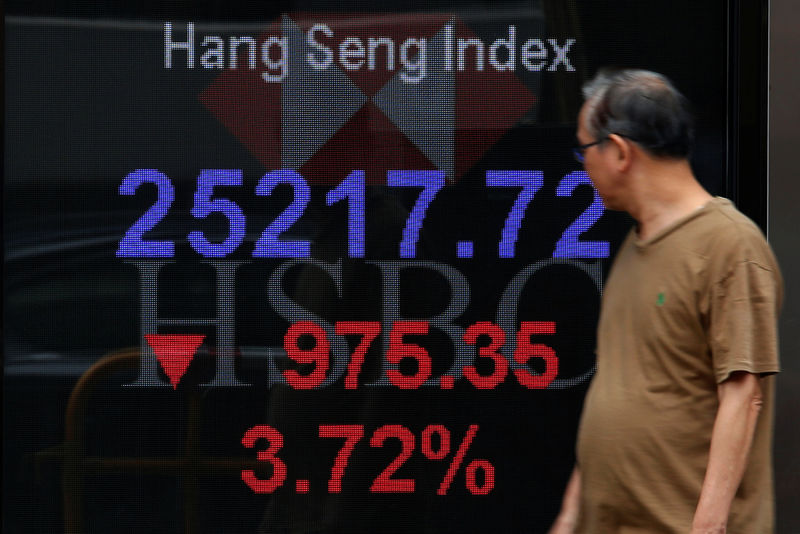By Noah Sin
HONG KONG (Reuters) - Apprehension over capital outflows triggered by escalating political unrest has driven Hong Kong's stock market to its lowest this year and pressured its currency, with analysts warning of more weakness.
The Hang Seng Index (HSI) fell 2.1% to 25,281.30 points on Tuesday, down 16% from the year's peak, and is at lows last seen in early January.
It has fallen over 8% since June 12, when street clashes escalated between anti-government demonstrators and the police.
Now into their third month, those protests ground Hong Kong's airport to a halt this week and forced flight cancellations even as both protester and police tactics turned increasingly violent.
Concerns over China's slowdown, as the Sino-U.S. trade war remains unresolved, have also dragged on Hong Kong's economy. The Hang Seng is Asia's second-worst performer after South Korea's this quarter.
Other risk indicators in markets are flashing red.
The Hong Kong dollar , pegged to the greenback at 7.75-7.85, was trading at 7.8465.
"The recent mounting social unrest was fuelling political risk and in turn capital outflow pressure," Ken Cheung, chief Asian FX strategist at Mizuho Bank, said in a note on Tuesday. "We do not rule out HKD falling to 7.85 level again."
Hong Kong leader Carrie Lam pleaded on Tuesday for a stop to the protests, having warned of an economic "tsunami" engulfing the city last week.
The protests have angered Beijing, which called them "sprouts of terrorism".
"Dropping the 'T' word is particularly disturbing as it does suggest a more aggressive mainland response, which triggered a wave of risk aversion across global markets," said Stephen Innes, managing partner at VM Markets in Singapore, referring to Beijing's response.
In the forex options market, risk reversal spreads were at their highest since 2016 on Monday in favor of dollar calls, suggesting investors are paying a high premium to bet on the Hong Kong dollar's drop.
A CSOP Asset Management ETF that allows investors to bet against the Hang Seng (HK:7500) jumped to its highest on Tuesday since launching in May.
The product broke its record in turnover of HK$916.2 million ($116.8 million) on Aug. 6, one day after protesters gridlocked Hong Kong with a general strike and the Chinese yuan fell to the weaker side of 7-per-dollar.
Local interbank rates have not moved much but a key gauge of cash levels in Hong Kong, banks' aggregate balances held with the central bank, stood at HK$54.4 billion as of Tuesday - an 87% decline from its 2015 peak, when the city attracted foreign inflows as global central banks kept interest rates at historic lows.
(Graphic: Under pressure-HK stock market: https://tmsnrt.rs/2N0J90m)
($1 = 7.8466 Hong Kong dollars)
